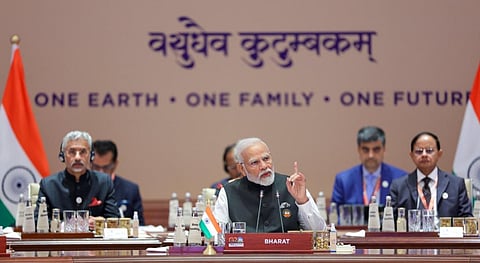

The Group of Twenty (G20) has adopted the G20 New Delhi Leader’s Declaration on September 9, 2023 with consensus on a number of issues. These include sustainable development goals (SDG), climate finance, energy transitions, using and restoring natural ecosystems, harnessing and preserving ocean-based economy, plastic pollution, reducing disaster risk and building resilient infrastructure.
In the declaration under the Green Development Pact for a Sustainable Future, the countries have committed to “urgently accelerate our actions to address environmental crises and challenges, including climate change”.
One of the aims of the declaration is "to tackle climate change by strengthening the full and effective implementation of the Paris Agreement and its temperature goal, reflecting equity and the principle of common but differentiated responsibilities and respective capabilities (CBDR), in light of different national circumstances".
The inclusion of the principles of CBDR is interesting as some developed G20 countries such as the United States have been averse to the usage or reiteration of the principles at other events and processes of the United Nations Framework Convention on Climate Change (UNFCCC).
For instance, this has been the case at the meetings of the transitional committee for the operationalisation of the loss and damage fund (LDF) through 2023. The LDF was agreed upon at Conference of Parties (COP27) to UNFCCC in Sharm El-Sheikh, Egypt in November 2022.
The G20 members also cited the findings of the Intergovernmental Panel on Climate Change (IPCC) Sixth Assessment Synthesis Report, stating that “Global greenhouse gas (GHG) emissions are projected to peak between 2020 and at the latest before 2025 in global modelled pathways that limit warming to 1.5°C with no or limited overshoot and in those that limit warming to 2°C and assume immediate action”.
But this peaking may not happen in all countries within this timeframe, they added. The document stated that the “timeframes for peaking may be shaped by sustainable development, poverty eradication needs, equity, and in line with different national circumstances".
The G20 members also highlighted the macroeconomic risks stemming from climate change and transition pathways.
For the restoration of natural ecosystems, the G20 countries committed to the full and effective implementation of the Kunming-Montreal Global Biodiversity Framework (GBF) and encouraged other countries to do the same.
They supported the G20 ambition of reducing land degradation by 50 per cent by 2040 on a voluntary basis. They noted the discussions on the Gandhinagar Implementation Roadmap and Gandhinagar Information Platform without giving out any details on the same.
The G20 document stated that “in the context of forests, we will avoid discriminatory green economic policies, consistent with WTO rules and multilateral environmental agreements. We are committed to mobilizing new and additional finance for forests from all sources, including concessional and innovative financing, in particular for developing countries. We commit to prevention and mitigation of wildfires and remediation of mining-degraded lands".
For harnessing and preserving the ocean-based economy, they welcomed the Chennai High Level Principles for a Sustainable and Resilient Blue / Ocean based economy and the adoption of “the new international legally binding instrument under the UN Convention on the Law of the Sea on the conservation and sustainable use of marine Biological diversity of areas Beyond National Jurisdiction".
The G20 countries also noted the institutionalisation of the Disaster Risk Reduction Working Group under the presidency of India, which catalysed efforts towards disaster risk reduction.
The document also talks about accelerating progress on early warning and early action through strengthening national and local capacities, innovative financing tools, private sector investments and knowledge sharing.
The members supported the United Nations’ initiatives such as the Global Platform for DRR and the Coalition for Disaster Resilient Infrastructure in “furtherance of such collaboration and sharing”.